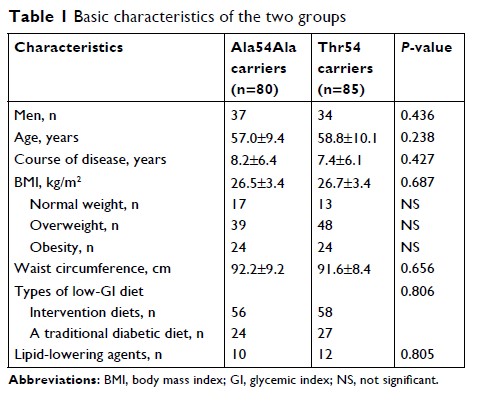108384
论文已发表
注册即可获取德孚的最新动态
IF 收录期刊
- 3.4 Breast Cancer (Dove Med Press)
- 3.2 Clin Epidemiol
- 2.6 Cancer Manag Res
- 2.9 Infect Drug Resist
- 3.7 Clin Interv Aging
- 5.1 Drug Des Dev Ther
- 3.1 Int J Chronic Obstr
- 6.6 Int J Nanomed
- 2.6 Int J Women's Health
- 2.9 Neuropsych Dis Treat
- 2.8 OncoTargets Ther
- 2.0 Patient Prefer Adher
- 2.2 Ther Clin Risk Manag
- 2.5 J Pain Res
- 3.0 Diabet Metab Synd Ob
- 3.2 Psychol Res Behav Ma
- 3.4 Nat Sci Sleep
- 1.8 Pharmgenomics Pers Med
- 2.0 Risk Manag Healthc Policy
- 4.1 J Inflamm Res
- 2.0 Int J Gen Med
- 3.4 J Hepatocell Carcinoma
- 3.0 J Asthma Allergy
- 2.2 Clin Cosmet Investig Dermatol
- 2.4 J Multidiscip Healthc

FABP2 Ala54Thr 多态性对低血糖指数饮食中血脂和血糖控制的影响与汉族 2 型糖尿病患者的性别有关
Authors Liu PJ, Liu YP, Qin HK, Xing T, Li SS, Bao YY
Received 2 December 2018
Accepted for publication 4 February 2019
Published 27 March 2019 Volume 2019:12 Pages 413—421
DOI https://doi.org/10.2147/DMSO.S196738
Checked for plagiarism Yes
Review by Single-blind
Peer reviewers approved by Dr Cristina Weinberg
Peer reviewer comments 2
Editor who approved publication: Professor Ming-Hui Zou
Background/aims: Low
glycemic index (GI) diets may have beneficial effects on glycemic control and
serum lipid levels in patients with type 2 diabetes, but whether its effect is
affected by polymorphisms of genes associated with lipid metabolism remains
unclear. This study investigated whether the effects of a low-GI diet on serum
lipids and glycemic control in patients with diabetes are associated with
polymorphisms of FABP2 Ala54Thr (rs1799883).
Methods: A
retrospective study was conducted involving 165 patients with type 2 diabetes
mellitus (T2DM) who participated in two completed trials. Parameters reflecting
the glycemic control, inflammatory factors, and fasting plasma lipids before
and after intervention were measured, and the polymorphism of rs1799883 for
each participant was genotyped using a MassARRAY. Differences between the
genotypes of rs1799883 before or after the intervention were compared, and
changes in the lipid profiles, glycemic control, inflammatory profiles, and
dietary intake from baseline were analyzed using an analysis of covariance
(generalized linear model).
Results: When the
data were analyzed as a whole, after 4–5 weeks of similar low-GI diet
intervention, we found that the decrease of triglycerides (TG) in the
homozygous Ala54 carriers was more significant than that in the Thr54 allele
carriers ([−0.58±1.24] vs [−0.14±1.08], P =0.015) with the adjustment for
potential confounding factors; furthermore, compared with the Thr54 carriers,
there was a significant trend in the decrease of total cholesterol (TC) in the
homozygous Ala54 carriers (P =0.057). Subgroup analysis revealed that in women the
homozygous Ala54 carriers exhibited a significant decrease of serum TG, TC,
fasting blood glucose, and glycated albumin in women, but this was not noted in
men.
Conclusion: The
effect of FABP2 Ala54Thr
polymorphism on response to blood lipids and glycemic control in low-GI diets
is associated with gender among Han Chinese patients with T2DM.
Keywords: type 2
diabetes mellitus, plasma lipids, fatty acid-binding protein 2,
single-nucleotide polymorphism, low glycemic index diet
